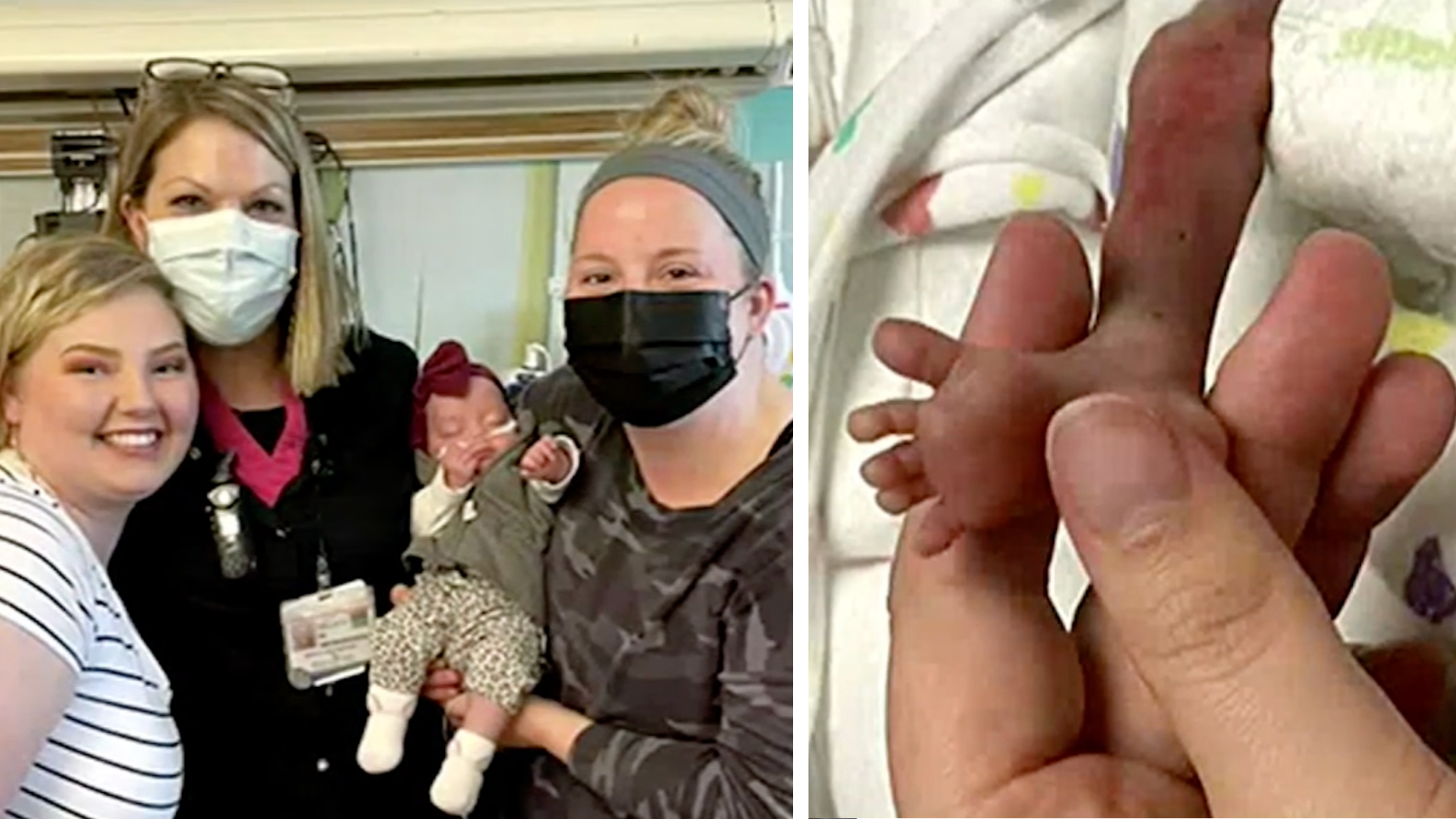
Megan Phipps of Lincoln, Nebraska, was early on in her pregnancy when she started to notice that it felt different from the times she was pregnant in the past. She went to the doctor looking for answers about her unborn twins and was diagnosed with uterine didelphys — a rare condition where a woman has two uteruses instead of one.
Phipps ended up giving birth to her daughters at a mere 22 weeks — and is now sharing her story to shed light on severe premature births.
Phipps had already been pregnant twice before, when but this pregnancy was different.
According to 1011 NOW, Phipps was due in mid-October and at first she and her boyfriend Dillion thought they were in for another normal pregnancy. When she started picking up on signs that things were going amiss, she went to her OB-GYN who referred her to a specialist, Good Morning America reported. It was then she learned about her condition: uterine didelphys. The specialist told Phipps she was pregnant in both her left and right uteruses.
She was also told that in the past, she'd given birth to her children using her right uterus.
"I've always carried in my right uterus. They always thought my left side wasn't active," she explained.
In June 2021, Phipps started spotting and was in "excruciating pain" so she went to Bryan Health hospital, she explained.
"It was very unexpected. Nobody believed me that I knew something was wrong," she told GMA. Her doctors told her that her cervix was shortening, putting her at risk for preterm labor. But a nurse noticed that the situation was much more urgent — at 22 weeks, Phipps was actually in the process of giving birth.
As she was being carted off to the delivery room, a neonatologist warned her that there was high risk involved with this type of premature delivery.
"He had said that the girls would have a 1% chance," she recalled to GMA.
Dr. Mark Brisso, a neonatologist who helped treat Phipps' twins at the hospital, explained that the hospital tries to respect the parents' wishes when it comes to cases like these. They’ll resuscitate preemies as long as parents understand that there are potential complications and while Bryan Health is a level-three facility and offers specialized care for premature deliveries, there was still a huge chance that the worst could happen.
"Because of the special circumstances of mom's pregnancy their chances of survival were less," Brisso explained.
Knowing the risks, Phipps decided to go ahead with the delivery anyway.
She told her doctors that if there was even a small chance of survival for her twins, she wanted as many interventions as possible. Phipps gave birth to her first daughter, Riley, on June 11. And her second twin, Reece, was born on June 12 — both babies were born weighing under 1 pound.
Twelve days after she was born, Riley sadly died.
"I put her ashes in her new urn, and ever since then she stayed with me and Reece up in the NICU until the day that Reece got to come home with us," Phipps told GMA.
Reece, meanwhile, was too fragile to leave the hospital and ultimately stayed at Bryan Health for 144 days.
She was given over a "dozen blood transfusions" and "was on a ventilator for 45 days," a representative for the hospital told GMA.
1011 Now reports that severe preemies are often born with medical issues involving their lungs and brain — but thankfully Reece progressed and grew without any complications.
Phipps told 1011 Now that above Reece’s crib was an ornament of a baby with angel wings. She’d put some of Riley’s ashes in it to keep the sisters near each other as Reece recovered.
Reece was finally released to go home on November 2 and weighed a healthy 8 pounds, 5 ounces.
She was both the youngest baby to survive delivery and was the longest staying newborn in the hospital’s NICU history.
"It's just another evolution or another step forward for our NICU to know that we can care for and successfully discharge even the smallest and most immature infant,” Brisso told GMA.
Phipps said the nursing and hospital staff were there for her every step of the way.
"Basically the only family I had was the nurses, doctors, and nurse practitioners that were there helping my baby," she said.
While Reece made great strides during her initial hospital stay, she was recently re-admitted to the hospital with metapneumovirus. Her doctors gave her a G-button, which dispenses food through her stomach and is back on oxygen to help her breathing.
Even given her daughter’s current medical setback, Phipps told GMA that she felt like her daughter is a success story — and she’s sharing their journey to encourage other preemie parents not to lose faith.
"I just want mothers to know that just to not give up hope that anything is possible," she said.




